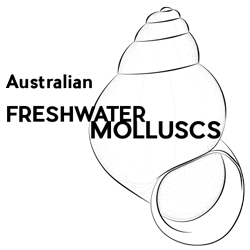
Fluviopupa gracilis is separated from F. ramsayi in having an elongate-pupoid shell and the distal end of the penis is longer (not shorter) than the accessory lobe. In F. gracilis colmani the mantle is weakly pigmented and the head-foot unpigmented. The ovate-pupoid shell has 3.5 to 4 whorls and tends to be smaller and narrower, with less pronounced sutures than in F. gracilis gracilis. The operculum either lacks or has a minute white spot on the inner side.
Fluviopupa gracilis colmani Ponder, 1982
Class Gastropoda
Infraclass Caenogastropoda
Order Littorinida
Suborder Rissoidina
Superfamily Truncatelloidea
Family Tateidae
Genus Fluviopupa Pilsbry, 1911
Original name: Fluviopupa gracilis colmani Ponder, 1982. In Ponder, W.F.(1982) Hydrobiidae of Lord Howe Island (Mollusca: Gastropoda: Prosobranchia). Australian Journal of Marine and Freshwater Research 33: 89-159.
Type locality: Stream behind Golf Course, Lord Howe Island. Snails in small pools in sandstone -clay, on undersides of stones and leaves.
In pools in small creeks and on moss and bare rock surfaces of seepages.
Lord Howe Island. On western slopes of North Hummock, Intermediate Hill and Smoking Tree Ridge.
The Lord Howe Island Fluviopupa species are rather similar in appearance but the different taxa are in distinct geographical locations on Lord Howe Island.
Ponder, W. F. (1982). Hydrobiidae of Lord Howe Island (Mollusca: Gastropoda: Prosobranchia). Australian Journal of Marine and Freshwater Research 33: 89-159.